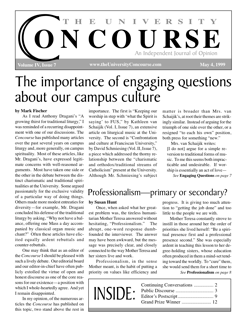Newman, education and context
by Kathleen van Schaijik
Ben Brown is right when he points out that a liberal education is neither sufficient nor necessary for salvation. But I doubt anyone here would disagree with him on that score. He also may well be right to caution us against a certain instrumentalization of knowledge—as if intellectual cultivation was worthwhile only insofar as it improved our moral or religious condition, or enhanced our professional skills. It is good to keep pressing the point that it is something valuable-in-itself.
But, still, I agree with those who think he goes too far when he so decisively separates the intellect and the will.
And we should keep context in mind. Newman was writing in a social climate that absurdly exaggerated the value of a liberal education—treating it as if it could replace religion in reforming society and bringing about the happiness of mankind. Therefore he was right to stress the limits of knowledge as such. Susan Fischer was writing in a social climate that underrates liberal education—treating it as worthless or dispensible because it isn’t “practical.” Therefore it was right for her to stress its high value. When Newman speaks of “liberal Knowledge” “considered in itself” he was expressly isolating it from a religion. Susan Fischer was explicitly speaking of liberal education within a “milieu” of faith; she was contrasting it with a merely technical training, which can result in narrowness and bigotry even among religious persons.
Other Newman quotes show how far he was from denying the ultimately religious aim of education in a wider sense.
When he became a tutor at Oxford, “he told his sister Harriet that he saw the tutorship as a spiritual undertaking and not ‘merely a secular office’.” (Ker’s biography, p.27)
Later, in the Tamworth Reading Room letters, he wrote, “Christianity, and nothing short of it, must be made the element and principle of all education. Where it has been laid as the first stone, and acknowledged as the governing spirit, it will take up into itself, assimilate, and give a character to literature and science. Where Revealed Truth has given the aim and direction to Knowledge, Knowledge of all kinds will minister to Revealed Truth.” (Discussions and Arguments, p. 274-5)
Being “taken up into” Christianity, the pursuit of liberal knowledge becomes inextricably bound up with the pursuit of total human perfection. This is especially true of theology, which Newman gives so high a place at a Catholic university. Knowledge of the Divine, acquired in a setting of faith, cannot help but leave an imprint on our souls.


